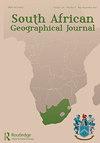COVID-19感染和家庭传播的社会经济和人口决定因素:来自尼日利亚的案例研究
IF 1.4
4区 社会学
Q3 GEOGRAPHY
引用次数: 0
摘要
许多研究已经将疾病流行的动态与社会、经济和人口状况的差异联系起来,但尚不清楚这些变量是否可以解释撒哈拉以南非洲部分地区COVID-19感染的空间分布。本研究评估了尼日利亚西南部一个典型行政州(一个相对典型的种族中心社区)中COVID-19感染的空间传播与社会人口风险因素的关系。使用的数据包括4.03万户家庭的社会人口统计学、收入变量、COVID-19状况和旅行史。对数据进行了频率、患病率和空间分布分析。结果显示,新冠肺炎病例在全州分布不均。该州北部和东南部的病例数相对高于其他地区。男性受访者的COVID-19病例患病率(3.7%)高于女性受访者(2.4%)。在70岁以上(3.5%)、丧偶(3.3%)和家庭成员在6至10人之间(4.9%)的应答者中传播最为主要。在州内有旅行史的人(9.1%)、接受过高等教育的人(3.8%)和自雇人士(3.0%)中传播率也相对较高。该研究将社会经济分布的不平衡与该地区COVID-19的多种传播联系起来,因此提倡改善居民教育和可持续生活的政策。本文章由计算机程序翻译,如有差异,请以英文原文为准。
Socio-economic and demographic determinants of COVID-19 infections and spread at household level: case study from Nigeria
ABSTRACT Many studies have associated the dynamics of diseases’ prevalence with differences in social, economic and demographic status, but it is not yet clear if the same variables explain the spatial distribution of COVID-19 infections in parts of sub-Saharan Africa. This study assessed the spatial spread of COVID-19 infections in relation to socio-demographic risk factors in a typical administrative state – a relatively typical ethnocentric community – in Southwestern Nigeria. Data used were socio-demographics, income variables, COVID-19 status and travel history of 40,300 households. Data were analysed for frequency, prevalence and spatial distributions. The results revealed that COVID-19 cases were heterogeneously distributed within the state. The number of cases was relatively higher in the north and south-eastern parts of the State than in other areas. Male respondents had a higher prevalence (3.7%) of COVID-19 cases compared to their female (2.4%) counterparts. Transmission was most dominant among respondents aged above 70 years old (3.5%), widowed (3.3%) and those who lived in households with between 6 and 10 (4.9%) members. Transmission was also relatively high among those with travel history within the State (9.1%), those that aquired tertiary education (3.8%) and self-employed (3.0%). The study associated imbalanced socio-economic distributions to a diverse range of COVID-19 transmission in the area and therefore advocated for improved policy on residents’ education and sustainable living.
求助全文
通过发布文献求助,成功后即可免费获取论文全文。
去求助
来源期刊

South African Geographical Journal
GEOGRAPHY-
CiteScore
3.40
自引率
7.10%
发文量
25
期刊介绍:
The South African Geographical Journal was founded in 1917 and is the flagship journal of the Society of South African Geographers. The journal aims at using southern Africa as a region from, and through, which to communicate geographic knowledge and to engage with issues and themes relevant to the discipline. The journal is a forum for papers of a high academic quality and welcomes papers dealing with philosophical and methodological issues and topics of an international scope that are significant for the region and the African continent, including: Climate change Environmental studies Development Governance and policy Physical and urban Geography Human Geography Sustainability Tourism GIS and remote sensing
 求助内容:
求助内容: 应助结果提醒方式:
应助结果提醒方式:


